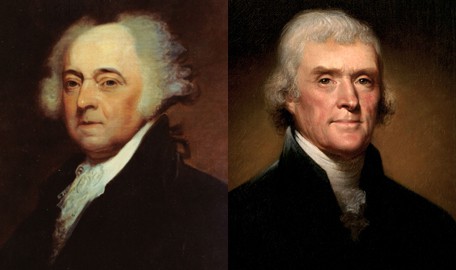
Demand a Peaceful Transition of Power
 (John Adams (l) and Thomas Jefferson (r) photo credit)
(John Adams (l) and Thomas Jefferson (r) photo credit)
One candidate issued alarming warnings that his opponent was a tool of far left radicals who would destroy the country. The other candidate claimed his opponent would lead the country to authoritarian rule. One of the candidates excoriated the newspapers, writing to a friend that the press was “…teaming with every falsehood they can invent for defamation.” The campaign was bitter, the election messy, the results in doubt for several months with the House of Representatives forced to make the final decision. But in the end, in the 1800 election, Thomas Jefferson defeated the incumbent President John Adams and became the third President of the United States on March 4 1801. In his Inaugural Address, President Jefferson called the nation to unity:
“…but this being now decided by the voice of the nation, announced according to the rules of the constitution all will of course arrange themselves under the will of the law, and unite in common efforts for the common good. All too will bear in mind this sacred principle, that though the will of the majority is in all cases to prevail, that will, to be rightful, must be reasonable; that the minority possess their equal rights, which equal laws must protect, and to violate would be oppression. Let us then, fellow citizens, unite with one heart and one mind, let us restore to social intercourse that harmony and affection without which liberty, and even life itself, are but dreary things. And let us reflect that having banished from our land that religious intolerance under which mankind so long bled and suffered, we have yet gained little if we countenance a political intolerance, as despotic, as wicked, and capable of as bitter and bloody persecutions.”
Jefferson went on to say, “…every difference of opinion is not a difference of principle. We have called by different names brethren of the same principle. We are all republicans: we are all federalists. If there be any among us who would wish to dissolve this Union, or to change its republican form, let them stand undisturbed as monuments of the safety with which error of opinion may be tolerated, where reason is left free to combat it.”
And in a subsequent section outlining the duties of the government, he underscored that the government must take “…a jealous care of the right of election by the people” as an essential principle of the new nation.
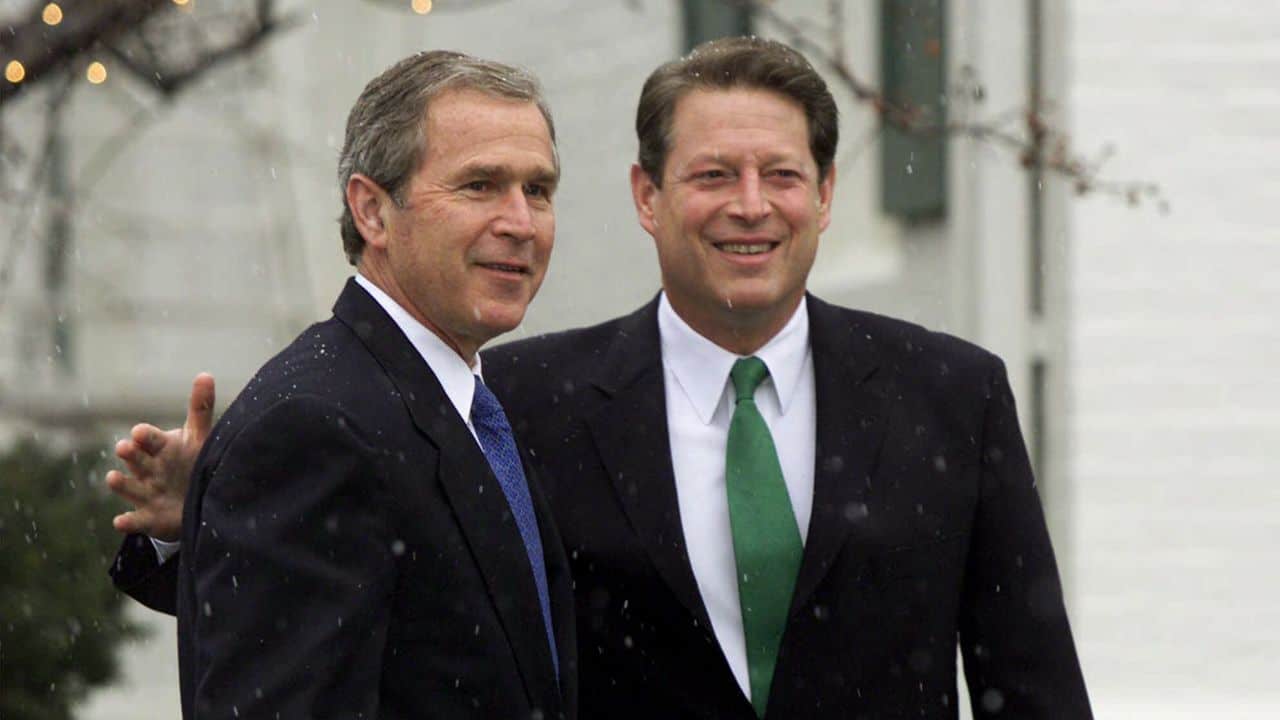 (President George W. Bush (l) and former Vice President Al Gore (r) photo credit)
(President George W. Bush (l) and former Vice President Al Gore (r) photo credit)
Many presidential elections since 1800 have been bitter, hotly contested, rife with outrageous accusations by opponents against each other, and some have even been so close as to require invocation of special Constitutional provisions to decide the winners. See Bush v. Gore in which the Supreme Court’s ruling stopped the Florida vote recount and effectively awarded the election to George W. Bush, defeating Al Gore.
In his speech conceding the election to President-elect Bush, then-Vice President Al Gore said,
“This has been an extraordinary election, but in one of God’s unforeseen paths, this belatedly broken impasse can point us all to a new common ground, for its very closeness can serve to remind us that we are one people with a shared history and a shared destiny. Indeed, that history gives us many examples of contests as hotly debated, as fiercely fought, with their own challenges to the popular will. Other disputes have dragged on for weeks before reaching resolution, and each time, both the victor and the vanquished have accepted the result peacefully and in a spirit of reconciliation. So let it be with us…I know that many of my supporters are disappointed. I am too. But our disappointment must be overcome by our love of country…While we yet hold and do not yield our opposing beliefs, there is a higher duty than the one we owe to political party. This is America and we put country before party. “
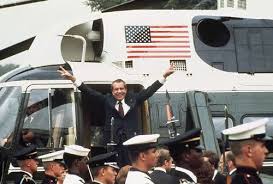 (Richard Nixon departs the White House August 9, 1974, photo credit)
(Richard Nixon departs the White House August 9, 1974, photo credit)
I remember standing in a huge crowd on the ellipse in August 1974 watching disgraced President Richard Nixon’s helicopter take off from the south lawn of the White House while Vice President Gerald Ford took the oath of office to replace Nixon after his resignation over the Watergate scandal. A little more than two years later, in January 1977, I watched newly elected Democratic President Jimmy Carter stroll along Pennsylvania Avenue in victory over the Republican President Ford. Four years later, I remember standing at the foot of the U.S. Capitol in 1981 as Republican President Ronald Reagan took the oath of office as the soundly defeated Democratic President Jimmy Carter looked on, just as the news broke that Iran had released 52 American hostages after 444 days in captivity, a crisis that contributed to Carter’s defeat. Eight years later, I was on the Mall for the inauguration of Democrat Bill Clinton who defeated Republican President George H.W. Bush in a hard-fought election contest. All of these were peaceful, dignified transfers of power, even in challenging circumstances.
President Bush left a hand-written note for President Clinton that read, in part, “There will be very tough times, made even more difficult by criticism you may not think is fair. I’m not a very good one to give advice; but just don’t let the critics discourage you or push you off course. You will be our President when you read this note. I wish you well. I wish your family well. Your success now is our country’s success. I am rooting hard for you.”
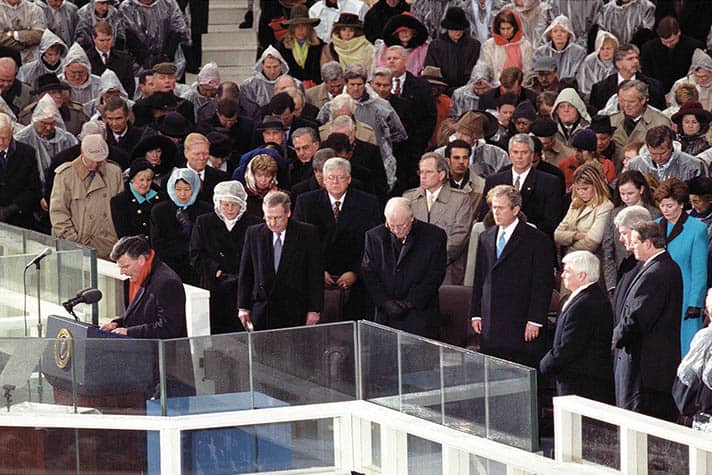 (Rev. Franklin Graham prays at George W. Bush’s inauguration (Bush right of center with bright blue tie) as President Clinton and Vice President Al Gore (far right) look on – photo credit)
(Rev. Franklin Graham prays at George W. Bush’s inauguration (Bush right of center with bright blue tie) as President Clinton and Vice President Al Gore (far right) look on – photo credit)
After the bitter disappointment of the 2000 election, defeated Democratic candidate and Vice President Al Gore stood alongside Democratic President Bill Clinton as Republican President George W. Bush took the oath of office on January 20, 2001. Looking on was former Republican President George H.W. Bush who was defeated by Democratic President Bill Clinton.
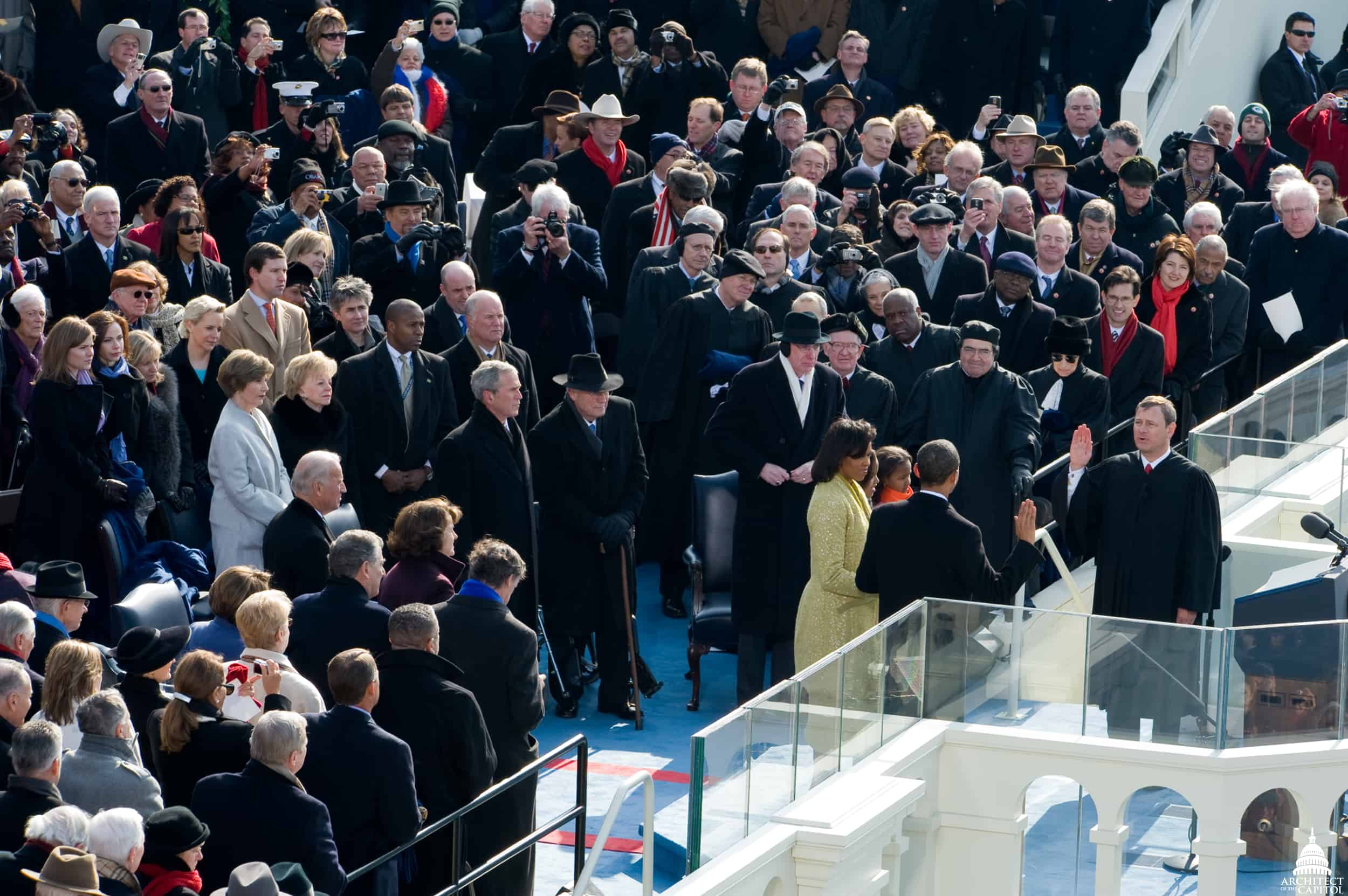 (President Barack Obama takes the oath of office as President Bush (center, left) looks on photo credit)
(President Barack Obama takes the oath of office as President Bush (center, left) looks on photo credit)
Eight years later, on January 20, 2009, I was again at the foot of the U.S. Capitol to witness another peaceful transfer of presidential power when Democratic President Barack Obama took the oath of office as former President George W. Bush looked on. And on January 20, 2017, Democratic President Obama and defeated Democratic candidate Secretary of State Hillary Clinton along with Presidents Bill Clinton and Jimmy Carter were on the dais when Republican President Donald J. Trump took the oath of office.
I offer this brief excursion through the history of presidential transitions to illustrate a fundamental principle of our way of life in the United States: no matter how hard-fought the election contest, no matter how acerbic the debates or how deep the differences of political philosophy and opinion, in the end we have a peaceful transfer of power among presidents.
While we celebrate the 4th of July as the date of American Independence, in a sense, January 20 should be celebrated as the day the nation is reborn every four years at the presidential inauguration. The date is sacred; the transfer of power occurs at noon according to prescribed rituals and traditions. The President takes an oath of office that reads:
- “I do solemnly swear (or affirm) that I will faithfully execute the Office of President of the United States, and will to the best of my ability, preserve, protect and defend the Constitution of the United States.”
NEVER has any outgoing president — whether defeated or ending two terms — NEVER has any president refused to leave office, or worse, threatened to disrupt and impede the democratic process by possibly using force to stay in power. There are countries where this happens. We call them tyrannies, juntas, dictatorships, fascist.
The current president of the United States refuses to say that he will accept the results of the election. He is doing his level best to undermine the validity of the electoral process by making false claims about the security of mail-in ballots, by lying about fraud in prior elections, by using judicial processes to block and upset state plans for the administration of elections during the pandemic crisis, by supporting state actions that make it harder for citizens to vote, especially Black citizens.
Worse, the current president refuses to say that he will leave office peacefully, that he will honor 239 years of American democracy and self-determination going back to the days when Washington, Adams and Jefferson had full and robust arguments but, in the end, acted for the best of the nation.
If he is defeated, President Trump must concede and leave office peacefully on January 20, 2021 at noon. He does not need to attend the inauguration, that is not required, although former presidents with maturity, grace and good manners did so because they realize that the peaceful transition of power is one of the greatest symbols of American strength to the world and the durability of our republic. But if he loses, the nation should not begrudge him an early trip to Mar-a-Lago.
And it goes without saying that the same is true if former Vice President Biden loses, he, too, must concede peacefully and respectfully. What we cannot tolerate is disruption and threats to American electoral process; what we must demand is respect for and affirmation of a peaceful transfer of power. It’s the only way we will be able to move forward. We, the People, must prevail.